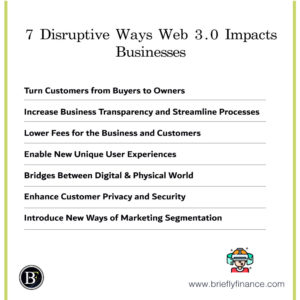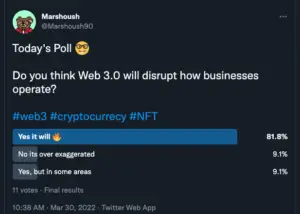Blockchain has changed the way people interact with the internet, users in the web 3.0 space have different expectations and views from using the internet in the traditional way.
Businesses will be impacted with web 3.0 technology but it is not going to be very quick and it will take time.

Attribution: The icons has been designed using resources from Flaticon.com
In this post we will discuss how can web 3.0 impact businesses.
Turn Customers from Buyers to Owners
With blockchain technology, the centralisation of a business power is shifting towards the customers. Customers can participate in the business infrastructure and capture some of the upside from doing that.
For example, Gala Games is a platform that provides a library of games utilising the blockchain technology and much more. As a decentralised platform, hosted data are saved in a network of computer nodes around the world.
To provide computing power for the network they sell nodes to their users. To simplify it these are basically ownership of servers hosting the game where buyers of nodes are rewarded in $Gala Token. If you want to know more check out this article in the link.

Source: https://app.gala.games/nodes
The web 3.0 technology allows turning customers from users to owners.
Introducing this type of business model will definitely have impact on the way customers treat the brands that they have ownership in and it will also impact how businesses in web 3.0 plan and allocate their resources.
Increase Business Transparency and Streamline Processes
Smart contracts, which are the scripts uploaded to the blockchain assist in defining the business process systematically. Whatever is in the smart contract code will be self-executed when users interact with it without having to have a third party or an employee processing the work.
For example, a NFT that will be launch with Alfa Romeo car is going to have record of key car data like mileage, maintenance, and transfer ownership…etc.
Such information will be transparent for prospective buyer making the transaction to be more transparent. Here is a video if you would like to see further details about it.
Just to emphasise, whenever a transaction takes place, everything is recorded on the blockchain for anyone to view. It is a matter of knowing the contract address and paste it in Etherscan (in case of Ethereum transactions).
Having said that, sooner or later customers will demand this technology for transparency and would not want to just “trust” the sellers specially for large transactions like cars or houses.
Lower Fees for Both the Business and Customers
With Web 3.0 the ability of working in a trustless framework without a third party is relatively easy to implement with smart contracts.
Businesses will be able to transact directly with customers. Customers will not have to trust the website because everything is recorded on the blockchain so they can quickly lookup the legitimacy of the contract address.
For example, many of us prefer to do payments with PayPal because we trust that this platform will help us do purchases and protect us from the seller if they did not actually deliver on our request.
We also trust eBay for the same reason. But with the blockchain, decentralised platforms could be programmed and buyers will not have to pay higher fees for their transactions to the third party while still ensure that the code in the smart contract delivers and auto-refunds if a misconduct occur.
The infrastructure of the networks are simply lowering costs for developers due to eliminating the trust involved and automation of the process.
Enable New Unique User Experiences
Unlike web 2.0 platforms where information they use to create for their users is based on personal data like their behaviour, location and more. With web 3.0 technology, it will be based on what the users have on their wallet.
This means that when users connect their wallet in a web 3.0 platform, the whole website experience could be tailored to this particular person and to what he or she has in his wallet.
For example, let us say a clothing e-commerce store is using this technology. Once a user connects to the website, the website will identify this person interests based on the items they have in the wallet. Whether they hold gaming NFTs, educational NFTs, or a PFP.
Bridges Between Digital & Physical World
Through augmented reality which are the real world experiences connected to the digital technology and bridging with physical hardware, web 3.0 can bridge and create unique experiences.
Blockchain technology helps allowing verified user ownership across the internet to easily connect what the user own in their wallet with real life implementations.
Let us say, a store provides discount offers for their NFT holders, their process should relatively easy to implement. It could be by programming the point of sale to identify that this NFT is verified by them (from their contract address and NFT metadata) and automatically allow the discount offer.
Also with how fast the internet is becoming, the businesses have a lot of creativity potential when bridging the technology. They may force users to wear augmented reality glasses to obtain the discount (based on our example above) and at the same time provide the users with personalised advertising experience live in the physical world to make money from them through ads! the possibilities are endless.
Enhance Customer Privacy and Security
With web 3.0 the privacy is now relatively safer because instead of hacking one centralised hosting solution which most traditional small business run, a hacker has to go through hacking a fully decentralised network of multiple computer to execute a transaction in those platforms.
Interacting with web 3.0 applications will be very useful particularly for customers of small businesses using the technology. They will be more security and even privacy (if there is no hacking there should be no data leak).
Introduce New Ways of Marketing Segmentation
Large organisations like Google, have a lot of information about our behaviours and activity. With such data they are able to provide marketers the ability to target their audience based on their behaviour on the internet, search terms, and whether they clicked or just viewed the ad.
Now with web 3.0 the technology marketers will be able to target users based on what they have in their wallet. So instead of advertisers choose audience based on their age, they may choose the customers that own a Bored Ape Yacht Club for example.
With everything transparent and ability to program smart contracts is getting mature, advertisers can show ads to the exact people they want, for our Bored Apes example the main collection is 10,000 so that is targeting the exact holders of this collection to advertise to.
This opens new way for online marketing and it will also be implemented not just on the websites but it will be through web 3.0 technology following these holders almost everywhere they go online and even offline through augmented reality!

Please follow me @Marshoush90 so we have more votes in the future!
Final Thoughts
It is still early to see all the potential creative implementations of web 3.0. but the way it provides ownership, transparency, security, and privacy to the customers allows it to function differently and add value to customers in a new way without breaching their privacy. There is much to learn and experience in this space, which is very exciting!
Related Posts:
- Cryptocurrency for Dummies – Everything I learned About it
- What is a Smart Contract? and How Does it Work?
- 7 Distinctive Characteristics of Web 3.0
Disclaimer: Above links are affiliate links and at no additional cost to you. I may earn a commission. Know that I only recommend products, tools, services and learning resources I’ve personally used and believe are genuinely helpful and relevant. It is not because of the small commissions I make if you decide to purchase them. Most of all, I would never advocate for buying something that you can’t afford or that you’re not yet ready to implement.

